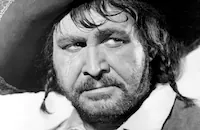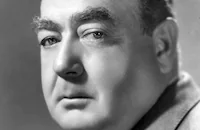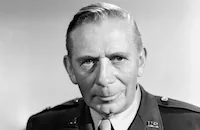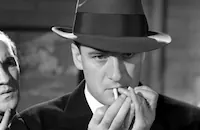The Big Street

Brief Synopsis
Cast & Crew
Irving Reis
Henry Fonda
Lucille Ball
Barton Maclane
Eugene Pallette
Agnes Moorehead
Film Details
Technical Specs

Synopsis
On the corner of Broadway and 50th Street in New York City, an eating contest is about to begin, pitting Nicely Nicely Johnson against Joe Duffle, when Nicely Nicely comes down with an upset stomach. Racketeer and nightclub owner Case Ables has bet $20,000 on Nicely Nicely, and to save Ables' investment, busboy Augustus Pinkerton II, known as "Little Pinks," suggests substituting his friend, Violette Shumberg, for the ailing Nicely Nicely. In the midst of the contest, Ables' girl friend, nightclub singer Gloria Lyons, enters the club with her little dog Baby. When Baby runs away, Pinks chases it, causing Violette to lose the contest and Pinks to lose his job. Feeling guilty over Pinks's loss of employment, Gloria arranges a job for him at the club in which she works. Pinks, who idolizes the self-centered Gloria, begins to address her as "her highness." When he begins to send her flowers with unsigned cards, Gloria, whose motto is "a girl's best friend is a dollar," thinks that her secret admirer is millionaire playboy Decatur Reed. One night, as Gloria is leaving the club with Decatur, Ables slaps her down the stairs and sends her to the hospital. Gloria's fall leaves her crippled, and through her long months of convalescence, only Pinks and Ruby, her maid, remain by her side. Ruby pawns Gloria's jewels to pay the hospital bills, and when that money is exhausted, Pinks invites her to stay at his apartment. Pinks' friends, Violette, Nicely Nicely, Horsethief and Professor B, stage a homecoming party for the ungrateful Gloria, who orders them out of the apartment. Soon after Gloria moves in with Pinks, Violette and Nicely Nicely marry and move to Florida. When Pinks tries to offer encouragement to the self-pitying Gloria, she proposes to make him her butler once she has married Decatur. After Gloria demands that Pinks take her to Florida to recuperate, the devoted busboy pushes her wheelchair down the "big street" to Miami, where they stay with Violette and Nicely Nicely. There Gloria orders Pinks to buy her some fancy pajamas so that she can go to the beach in style. Instructing Pinks to pose as her houseboy, Gloria suns herself on the beach and meets Decatur, who is unaware of her condition. Upon seeing Gloria in a wheelchair, Decatur loses interest in her, and she blames Pinks for her misfortune. Disgusted, Pinks walks out on her and finds a job as a busboy. When he learns that Ables is managing the club in which he is employed, Pinks slugs the racketeer for his treatment of Gloria. At that moment, Violette appears with news that Gloria is sick, and Pinks rushes to her side. The despairing Gloria confides to Pinks that she dreams of spending one last night attired in a bejewled gown. When the doctor warns that Gloria's only chance for survival is the restoration of her hope, Pinks sets out to find the dress. Seeing it worn by socialite Mimi Venus, Pinks sneaks into the Venus house, where he overhears Mimi being blackmailed by one of Ables' gang. The man threatens to expose Mimi's infidelity unless she allows their syndicate to steal her jewels. After snatching the gown from Mimi's closet, Pinks dons a mask and demands the thief's stolen jewels. Pinks then visits Ables and threatens to expose him to the police unless he agrees to hold a private party at his club in honor of Gloria. Following Pinks's instruction, Ables issues invitations to Decatur and the other socialites. Horsethief, Professor B and Pinks's other friends who have migrated to Florida make sure that they attend. On the night of the party, just as Gloria is introduced to her guests, the police, who have found Pinks's social security card in Mimi's closet, come to arrest the busboy. Explaining Gloria's situation to the police and Mimi's husband, Colonel Venus, Pinks begs for one last night of freedom. When the colonel learns of his wife's infidelity and Pinks's devotion, he insists upon dropping the charges and gives Pinks a set of tails to wear. As Pinks speaks to the police, Nicely Nicely tells Gloria of the busboy's predicament, and she finally comes to recognize his sacrifice. Pinks then appears at Gloria's table, and after he lifts her up, the two "dance" and she confides that she is finally happy, voicing one last desire to climb the stairs and gaze at the ocean. Gloria then collapses and dies in Pinks's arms, and he carries her up the stairs to fulfill her final wish.

Director
Irving Reis
Cast

Henry Fonda

Lucille Ball

Barton Maclane

Eugene Pallette

Agnes Moorehead

Sam Levene

Ray Collins

Marion Martin
William Orr
George Cleveland
Vera Gordon

Ozzie Nelson

Louise Beavers

Millard Mitchell
Juan Varro

Hans Conried
Harry Shannon
William Halligan

John Miljan
Don Barclay
Julius Tannen
Eddie Dunn
Bert Hanlon
Bob Perry
Anthony Blair
Art Hamburger

Addison Richards
Ann Summers
Chester Huntley
Sammy Stein
Johnny Indrisano
Warren Jackson
Tony Merlo
Peter Duray
Arnold Virt
Jack Chefe
Joe Niemeyer
Don Kerr
George Magrill
Frank Moran
James O'gatty
Walter Soderling
Shimen Ruskin
Ralph Peters

Marie Windsor
Catherine Fleyton
Charles Hall

Elliott Sullivan
Al Hill
Donald Kirke
Mimi Doyle
George Noisom
Dewey Robinson
John Miller
Wayne Mccoy
Jimmy Dime
Ross Forrester
Jim Toney
Lee Moore
Charles Cane
Lou Wood

George Mckay
Frank O'connor
Joe Scadato
Sally Wadsworth
Mary Stuart

Mary Halsey

Richard Martin

Russell Wade
Wilbur Mack
Julie Warren
Crew
C. Bakaleinikoff
Clem Beauchamp
Mel Berns
Claude Carpenter
Albert S. D'agostino
Mort Greene
Chester Hale
William Hamilton
Al Herman
Russell Metty
Harry Perry
Renie
Harry Revel
Damon Runyon
Darrell Silvera
Leonard Spiegelgass
Richard Van Hessen
Vernon L. Walker
Roy Webb
Freddy Wittop

Photo Collections
Videos
Movie Clip



Trailer
Film Details
Technical Specs

Articles
The Big Street
That was about to change. Writer Damon Runyon had just struck a producing deal with RKO and was looking to make a movie out of his short story Little Pinks. It was the tale of a busboy, "Little Pinks," in love with a heartless showgirl named Gloria, also known as "Her Highness." When she is beaten up and pushed down the stairs by her gangster boyfriend, Gloria becomes crippled and is confined to a wheelchair. But Little Pinks still loves her, despite her utter callousness, and spends all his resources out of this love, even taking her to Miami so she can woo a rich man. (Andy Warhol later called this "the sickest film ever made.")
Runyon wanted Charles Laughton and Carole Lombard for the picture, but neither wanted to do it. Laughton thought himself wrong for such a timid character so Runyon acquired Henry Fonda on a loanout from Fox. Lombard felt she wasn't hard-edged enough to play Gloria and suggested Lucille Ball. RKO wasn't crazy about the idea because Ball was not a big enough star, but Runyon persisted and eventually won the argument.
Worried about the best way to play such an unlikable character, Ball sought some advice from Laughton. "Don't soften it," he told her. "If you play a bitch, play it!" Carole Lombard's death in a January 1942 plane crash made Ball even more determined to give the part her all; she decided it would be a way of honoring her friend who had originally recommended her for it.
The shoot didn't go very well for Ball. Director Irving Reis was young and inexperienced. Fonda, an ex-boyfriend of Ball's, was remote and unhelpful. And Ball's husband Desi Arnaz lurked around the set, paranoid that Ball and Fonda would rekindle their romance. (They didn't.) Nonetheless, Ball mustered an excellent performance and forever looked back on The Big Street as her favorite film and proudest role.
By the time The Big Street was released in mid-1942, Runyon had left the studio (after only a five-month stint), Reis had joined the Army, editor William Hamilton had died, and Henry Fonda was back at his home studio, 20th Century-Fox. Perhaps all these are reasons why RKO didn't promote the movie very aggressively. But that didn't stop the critics from noticing Ball's breakout performance: "The girl can really act," declared Life. "It shows Lucille Ball as a first-rate actress, far ahead of any of her other screen roles," gushed Variety. And James Agee wrote in Time, "Pretty Lucille Ball, who was born for the parts Ginger Rogers sweats over, tackles her 'emotional' role as if it were sirloin and she didn't care who was looking."
Despite the rave reviews, the movie was a box office dud and RKO had no real plans for Ball. Her performance had caught the eye of MGM producer Arthur Freed, however, who now wanted her for his upcoming musical Du Barry Was a Lady (1943). With Ball's RKO contract approaching expiration, RKO gave her the chance to share the remainder of her contract with MGM or Paramount, which had also expressed interest. Ball chose MGM because of its emphasis on musicals. (She would end up making only one more picture for RKO - Seven Days' Leave, 1942.)
Editor William Hamilton, who died at age 48 while finishing The Big Street, was a top cutter at RKO whose credits included Suspicion (1941), In Name Only (1939), Stage Door (1937), Shall We Dance (1937) and Top Hat (1935).
Ball and Fonda had previously appeared together in I Dream Too Much (1935) and would team up for one more feature in 1968: Yours, Mine and Ours.
Producer: Damon Runyon
Director: Irving Reis
Screenplay: Damon Runyon (story), Leonard Spigelgass
Cinematography: Russell Metty
Film Editing: William Hamilton
Art Direction: Albert S. D'Agostino, Alfred Herman
Music: Roy Webb
Cast: Henry Fonda (Agustus Pinkerton), Lucille Ball (Gloria Lyons), Barton MacLane (Case Ables), Eugene Pallette (Nicely Nicely Johnson), Agnes Moorehead (Violette Shumberg), Sam Levene (Horsethief).
BW-89m. Closed captioning.
by Jeremy Arnold

The Big Street
Quotes
Trivia
Notes
The opening title card reads: RKO Radio Pictures, Inc. presents Henry Fonda and Lucille Ball in Damon Runyon's The Big Street. The working titles of this film were It Comes Up Love and Little Pinks. According to news items in Hollywood Reporter, the production of the film was delayed because of a lack of suitable female stars at RKO. The studio negotiated with both Barbara Stanwyck and Jean Arthur for the female lead; Arthur declined. Modern sources note that Damon Runyon finally demanded Lucille Ball, whom he had met through Carole Lombard, be given the lead. Another item in Hollywood Reporter adds that Ball's participation in the film was jeopardized when the studio suspended her for refusing to go on loan to Fox for Footlight Fever (see below) because she objected to fourth billing. Ball was coached by New York dance director Chester Hale, according to Hollywood Reporter. On the basis of her performance in this film, Ball was offered a contract with M-G-M, according to modern sources. Henry Fonda was borrowed from Fox for the male lead. Other news items in Hollywood Reporter note that Harry Perry shot background scenes in New York City and Miami. This was director Irving Reis' last film before joining the military. Modern sources add that Ball's singing voice was dubbed by Martha Mears. The character of "Nicely Nicely" also appeared in the novel Guys and Dolls which was made into the 1934 Warner Bros. film A Very Honorable Guy (see AFI Catalog of Feature Films, 1931-40; F3.4910) and the 1955 film Guys and Dolls.















